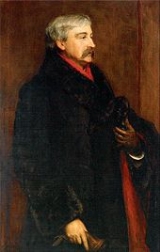
author
and poet
, best remembered for his accounts of pioneering life in California
.
He was born in Albany
, New York
, on August 25, 1836. He was named Francis Brett Hart after his great-grandfather Francis Brett. When he was young his father changed the spelling of the family name from Hart to Harte. Later, Francis preferred to be known by his middle name, but he spelled it with only one "t", becoming Bret Harte.
An avid reader as a boy, Harte published his first work at age 11, a satirical poem titled "Autumn Musings," now lost.
Well, no offense:Thar ain't no senseIn gittin' riled.![]()
Howbeit, though no scholar, I am not one of those who misuse the English speech, and, being foolishly led by the hasty custom of scriveners and printers to write the letters "T" and "H" joined together, which resembleth a "Y," do incontinently jump to the conclusion the THE is pronounced "Ye,"--the like of which I never heard in all England.![]()
Later, when we were forced to accept the fact that finding gold was really the primary object of a gold-mining company, we still remained there![]()
And then, for an old man like me, it's not exactly right,This kind o' playing soldier with no enemy in sight.![]()
And he says that the mountains are fairerFor once being held in your thought;![]()
Don't be too quickTo break bad habits: better stick,Like the Mission folk, to your arsenic.![]()
There is peace in the swamp, though the quiet is Death,![]()
But, when the goddess' work is done,The woman's still remains.![]()
Each lost day has its patron saint!![]()
Virtue always meets reward,But quicker when it wears a sword;![]()

